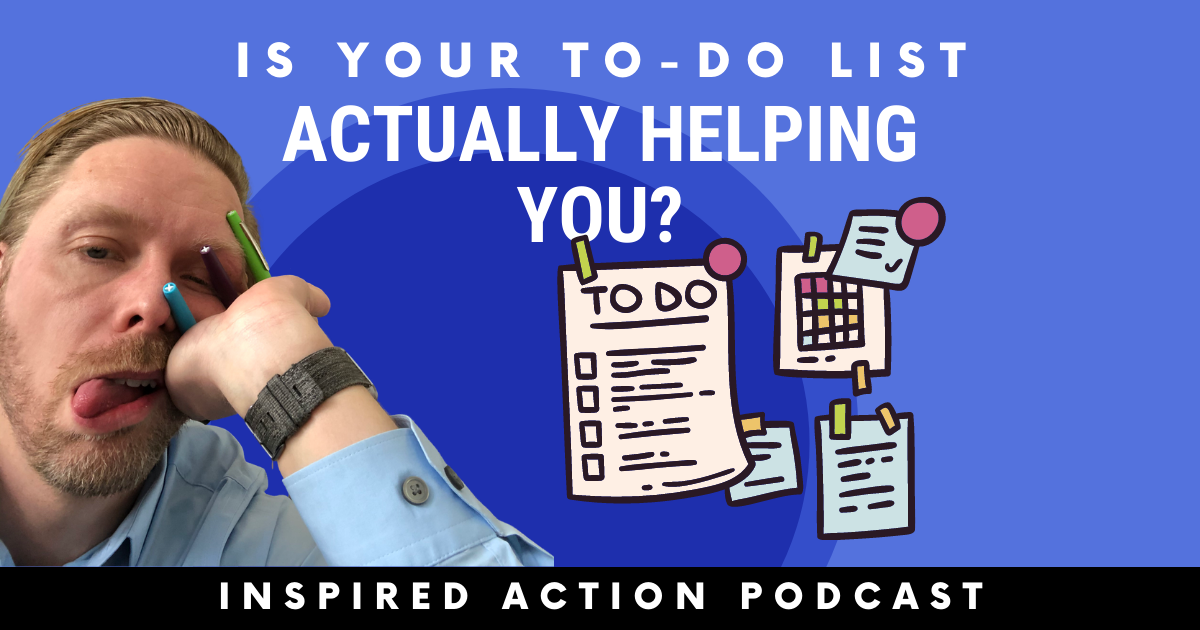“Is Your To Do List Actually Helping You?” Brief Summary of Show:
Most of us these days have a To Do List when we need to get stuff done, but is your To Do List actually helping you? In this Inspired Action For Imperfect Humans podcast episode, hosts Kyle Kalloo and Christopher Lawrence discuss To Do Lists, when they can be helpful, and also when they are an absolute detriment to being productive, and can sometimes be counter-productive.
Calls to Action:
Tell us your “inspired stories” stories by visiting www.InspiredActionPodcast.ca
Christopher Lawrence LinkedIn: https://www.linkedin.com/in/career-life-coach-christopher-lawrence/
Kyle Kalloo LinkedIn: https://www.linkedin.com/in/kyle-kalloo/
Change My Life Coaching & Partner Group LinkedIn: https://www.linkedin.com/company/6446498/admin/
Change My Life Coaching: https://changemylifecoaching.ca
Strategic Leader: https://strategicleader.ca/
*Please subscribe, download, provide a 5-star rating, and leave a review so we can grow our community of listeners.
“Is Your To Do List Actually Helping You?” Transcript:
So it feels really good to cross stuff off the list, but then we’re not necessarily actually doing things that add value to our life, #storyofmylife. Is the thought of being imperfect, keeping you from taking action? Welcome to “Inspired Action for Imperfect Humans.” Each week, we give you real life stories and thought provoking research that inspires your soul to live a more fulfilled life through your own actions. From the heart of Calgary, Canada, here are your hosts, award-winning coaches, Christopher Lawrence and Kyle Kalloo.
Well, hello, hello, hello, it is Kyle Kalloo with Christopher Lawrence for another week of imperfect inspired action. And I really wanna talk about something that I have been talking about for years. I sometimes introduce this to a lot of my clients. Sometimes I get some pushback. Sometimes the subject doesn’t go over so well, because I didn’t know how many people out there have a to-do list. Do you have a to-do list? How do you feel about a to-do list?
Yeah, I don’t even wanna do this podcast because I feel like, okay, let’s just start with this graphic story. There was a time, y’all know that Kyle and I were in a relationship at one point in time.
Yeah, the best time
And if you don’t,
of his life, yeah.
now you do. Yeah, it was, like, the best time for discovering what I didn’t want in a relationship, in any case-
Anyway, get back to it .
I was, like, overwhelmed by a to-do list of things. Girl, do you remember this moment?
I do remember that moment .

And I knew that it wasn’t helping, like, some of these things weren’t adding value, but it’s just, like, you know, I think for people in life having a to-do list, it’s a way of organizing yourself. But also for people who are really good at listing, it’s a way of achieving. It’s a way of creating achievement. So what it does is, it gives you a dopamine response, right?
Right.
Like when you cross something off your list, you get dopamine response. So here’s the thing, people can actually become addicted to it where it’s like they’re crossing stuff off. So not clinically addicted as would be defined in the “DSM-5,” but to the point where actually the list starts controlling their life more than they are controlling their life.
Exactly.
So it feels really good to cross stuff off the list, but then we’re not necessarily actually doing things that add value to our life, #storyofmylife, #40yearproblem. And so Kyle and I are sitting in this car and he’s trying to convince me that maybe it’s time to get rid of this to-do list. And I had a mother fuckin’ meltdown.
Oh, boy, was it ever.
Like, I fuckin’ cried and cried and cried. He wasn’t wrong, but it is, like, it’s addictive. Like it is certainly habitual for me. I think listing, you know, especially for people who maybe struggle with a bit of depression, anxiety, I think what it does is it helps get things out of the head so that the rumination stops and they can kind of do away with the overwhelm. The challenge is, is that people who are doing that and writing everything down, they’re not actually going through that list and saying what’s valuable here? So now that I’ve got it out of my head, I’ll come back to it later. When they come back to it later, they see it as a must-do rather than a let me check and see if this is a valuable task. Now that I’ve said that I disagree with everything I said. I think listing is a powerful tool, and I think that people who don’t list basically are devil worshipers.
Like me, what? No, what?
Like Kyle.

No, you know what, listen. And you actually said all the things I wanted to say is that, yes, there are certain things that it plays a role. There are certain things that you know, that means there’s value, it matters, it makes sense. Put them on the list. You wanna get it down, right? You wanna get it done. It’s on the paper, great. There’s some people who also have anxiety when they don’t get through their lists, right? The stuff that, again, and the stuff that they’re freaking over are the things don’t even matter, right? So all I’m introducing for you guys to at least, I’m inviting you to consider, why not have a not-to-do list? Since you’re all about the list anyway, why don’t you create a not-to-do list? Meaning these are the things that drains you. These are things that is a distraction to your day and to your productivity. It actually doesn’t fuel you. That you may be doing habitually, that maybe you be doing because is a routine of you always doing it. Why don’t you just start looking at that list and say, how much of those things that actually requires my attention, my expertise, and those things that don’t? Can we just put it on the list somewhere else? I tell you when, and I know Christopher, I know you do this, too, with some of your clients, when we get to a money situation where we say, why don’t you just track where you’re spending your money? Why don’t you just make a list of where, we don’t tell them to do anything else with it.
No.
It’s amazing. What happens when they come back to us after a week or two of doing that? What do they usually say?
Oh, 99% of the time they’re floored at how much they eat out.
Absolutely, right? They’re just like, what?
Yeah.
I can’t believe that.
Eating out, it’s not everybody, but the vast majority eat, they’re like, “Oh, my God.” I did this with one client, $2,000 on eating out.
Wow!
And this is somebody who is basically a minimum wage worker. And I think it was in a six- or eight-week period that it was 2000 or $2,200 on eating out. And I’m like, how do you even afford that? Like, I don’t know. And he’s like, I don’t know what happened.
You know, in the one can say there is a value being expressed there. Is there something behind that, right? It could be a social setting. I need to be out with people. Maybe I want the comfort of other food, I’m a foodie. Like, there’s so many other things. So we’re not asserting those are bad things. We’re just simply saying, be aware. Like all this stuff is, again, being aware. When we do, reason why we’re talking about these things, ’cause I think at the end of the day, what we do as coaches and facilitators is really trying to empower people to get really clear for themself. How do they take action and how do they really lead it back to fulfillment? That’s what we want for you. We know when you’re drained and you’re distracted and you don’t have flow or balance, whatever terms you wanna use. We know that drains you, and we don’t feel good about those things. Hence why we say there’s a people without even knowing they’re crippling themself by doing things that doesn’t provide them value. And that’s all we’re saying with the list because we, you know, we’re not just talking only to people who do list, but that just seems to be the subject today is, be mindful. If you looked at your list right now, of the five or 10, and here’s what I found, a lot of list people don’t have five or 10 things. They have like 22 things, 30 things on that list. I’m just saying, if you go through that list, say just indicate, highlight. Christopher, I’m doing some of your stationery, highlight stuff up, highlight on the list that has value.
Yeah, people who don’t like stationery also worship the devil. I love stationary. I love it so much I started making my own.

I did that for you. I did that for you. We should talk about that one day. So here’s my task for you. So I don’t know what research is out there and I’ll give Christopher a second to see what he could find, but I want you to just think about your list, and here’s the imperfect inspired action on what you consider. Go through your list, even a previous list, and just highlight, in your favorite highlighter, the things that provided value for you, that filled you up, that really motivated you, that spoke to your values, that really kind of said, hey, these are the things I wanna be able to do. Just highlight it. And then I want you to use a red pen, because, of course, red pen is like striking out from our teacher, and I want you to strike out the things that provided no value to you. Like, you didn’t even have to do it. Someone else could have done it, right? ‘Cause I’m not saying, there’s things that you still have to do, don’t don’t get me wrong. But I’m just saying, just look at things that you didn’t really need to do, or it was draining to you. It, like, just sapped your energy. Just go through that. What do you think about that, Christopher?
See this is where I struggle a bit. So I’ll look at something like email. Email is something that falls on my list of things to do, for sure it does. I actually hate email. It doesn’t fill me up. If I never had to look at an email again for the rest of my life, I would be happy. I hate text messaging. I hate social media. I hate all of that stuff. I love getting on the phone and having a conversation with somebody. That’s how I prefer to operate. I try to do that. The problem is none of those things have added value in my life. Zero, none. The problem is our world has moved away from that. And all email is, is just another list
Task.
to get a dopamine response to check stuff off. And yes, it’s a communication tool, this and that, right? I find as the younger generations come in and stuff like that, they’re not very email savvy. They’re not keen on email, so instead they use text messaging. But text messaging is an interruption 24/7, right?
Right.
And so it’s like, I will not text message with my clients, for sure. Like I just don’t do it because it’s a violation. Some people say, get a second phone. And it’s like, well, you know, that’s an unneeded expense, and it’s like, turn your notifications off. Girl, my notifications are off but I still have to go in to see if my husband has texted me and-
Or use your phone. Just use your phone.

And then I see that my clients have texted, or whatever, so I just don’t do it. So, I don’t know, I think that there’s a lot more research that needs to be done in this. I think if you wanna take Kyle’s activity and give it a try, I don’t think it’s a bad activity. I think even just, you know, you’ve got your to-do list, but maybe there needs to be three, four or five questions at the top of all of your lists where it says which of these activities are actually important to progressing me forward in a way that I want to, right? Which of these activities, if I don’t do them, are going to have a negative impact on me in such a way, you know, that it’s gonna set me back in some way. There is some research. I think there’s some value in this that I think people who list don’t do. People who list typically cross stuff off a list and they feel good, but very rarely do people who list actually list things that they’ve gotten done. They don’t sit there and write out what achievements have they had?
Exactly.
What have they gotten done? What have they accomplished? And they don’t reflect on those. Instead, they just cross something off and say, “Ah, that feels better” and move on. But when we actually do a got-done list, it has been shown, so when we focus on past achievements, it boosts our creativity, productivity, and happiness. This is what the research is showing.
Is that as similar to what we talk about mini-wins? During someone’s day when we say, hey, just kind of put that stuff down, because we find oftentimes people don’t even remember they did a whole bunch of stuff. Like I say, you know, I woke up, number one is a win. The next thing I say to myself is, I made the bed. That’s another win, right? So when we talk about getting things done, I think it’s important for us to recognize that, like, we got things done today, right? ‘Cause that’s about the done-ness for some people. Would you say it’s the same as the mini-win journal that we sometimes talk about? Or is that a completely different thing?
Yeah, so let’s be clear about what that is. Mini-win journal is just a way of focusing on your success. So what we try to do with this is we’re developing neuroplasticity of getting people, so basically we’re establishing a habit of getting people to be and remain success-minded. So by focusing on the successes that we’ve had, no matter how big or small they are, like a mini-win might be like, hey, I showed up on time today. That’s a win for somebody who isn’t necessarily doing that, right?
On time.
And it’s okay if some of those wins are the same. But basically it’s creating a neuroplasticity, a habitual way of thinking about successes so that in our lives we remain success-minded. We’re looking for the silver linings. By doing that, we typically maintain a more positive mindset and a more positive mindset typically helps us accomplish, achieve, or experience more fulfillment in our lives. There is something to remember to write. Optimists will always think that they can do more than they can. So optimists will very rarely meet their own expectations. A pessimist is more accurate in their assessment of what they can accomplish. So people who are more pessimistic in thinking, they’re more accurate in being able to achieve what they want. Or, sorry, being able to see what they can actually achieve. So it’s sounds like being a pessimist is actually to our benefit in terms of being accurate about what we can do, but here’s the caveat. The optimist will always achieve more than the pessimist because the optimist believes they can do more. Whereas the pessimist will stop at what they believe they can achieve.
Limitations, yeah. Interesting.

So it is their limitation. So optimists are horrendous at setting timeline-based goals. They’re horrendous at being able to fully achieve what they want to achieve fully. Whereas, a pessimist will be more accurate, but the optimist will always achieve more. They will always go further than the pessimist because they don’t have the limiting thinking. Where the optimist needs to be really careful is in the self-criticism of the gap of what they didn’t achieve.
What they didn’t achieve.
They have to be more reflective back on that win side or on that mini-win side of, hey, even though I didn’t get where I wanted to, here’s where I did get, which is way further ahead than I thought I would. That’s where the optimist has to be really careful because that inner critic can sometimes come in and rip us apart.
Come out.
You know, basically it’s like having your own version of Kyle in your head.
I knew, I tried to get in there before he got there because I knew he was going to, and I think that’s what we’re trying to say is at the end of the day, we know how it feels when we feel good about ourself when we do something.
Kyle, you’re actually really cutting out right now, and I don’t know if that’s coming through in the audio, but I can’t hear you, so.
Oh, yeah. Oh, okay. Can you hear me-
I can’t hear you at all. So folks, I think the inspired action here, I’m gonna give Kyle a bit of a break ’cause, you know, he’s been talking a lot today. The inspired action is , you can see him like flailing his arms. You think he’d be troubleshooting this issue, but instead he’s just reacting to what I’m saying. Folks, the inspired action here is to kind of look at your listing and to see if it’s actually adding value to your life, to see if it’s actually making a difference for you. And to see if those are the things that are moving you forward. I can say that, for me, this has been an ongoing journey. I often need to stop and reflect if the activity that I’m doing is actually adding value, and it’s so much easier just to get it done and cross it off than to do the work of sitting back and doing that emotional check-in. But that check-in is really important in having a fulfilled life. So take some inspired action. Let it be imperfect, and let us know how it went. Have a great week.
[Announcer] It’s our goal to build a global community of inspired action-takers, and we can only do that with your help. So if you love inspired action, please leave a review on your favorite podcasting app and share us on your socials. You’ve heard from us, now we wanna hear from you. Go to inspiredactionpodcast.ca and tell us what is the inspired action you took this week? Next week on “Inspired Action for Imperfect Humans.”
People who are happy and thriving are 12% more productive.



